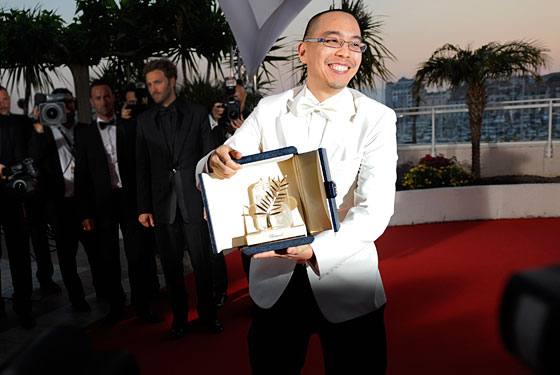
This year, there was intense speculation about which grizzled, senior auteur would receive the Palmes d’Or at the Cannes Film Festival: Would it be Mike Leigh’s well-reviewed, well-wrought drama Another Day, Bertrand Tavernier’s picture-pretty period film The Princess of Montpensier, Abbas Kiarostami’s Certified Copy, or Ken Loach’s hot-button Iraq contractor film, Route Irish? In the end, the film did not go to a gold-plated legend who barely needed the boost, nor to a gravely topical director like Doug Liman, but to 39 year-old Thai art-house star Apichatpong Weerashethakul, for his dreamy, spirit-haunted drama Uncle Boonmeee Who Can Recall his Past Lives, about a dying man brought face-to-face with the distorted ghosts of his wife and others. Despite Weerashethakul’s status as a bona fide critics’ favorite, few have actually seen his films (Syndromes and a Century earned just $60,000 worldwide). Since none of the big topical Cannes films are going to take the world by storm this year Ken Loach’s Route Irish won’t be another Hurt Locker and Doug Liman’s dull, straightforward Fair Game won’t entertain at least the award went to an auteur who dearly needs the exposure.
As the first Southeast Asian film director to win the Palmes d’Or, it’s something of an upset — and also a sign of the festival’s evolution, since Weerashethakul’s career has been cultivated and developed, in part, by Cannes. He won the Un Certain Regard prize in 2002 for his debut film Blissfully Yours. In 2004, he scored a special jury prize for Tropical Malady. Weerashetakul’s films can be mystically obtuse, or almost inexplicably moving — but they’re never less than beautifully shot. He pairs an unmistakably vivid and lush visual aesthetic with a serene, oblique sense of narrative, and it’s easy to imagine that his striking eye attracted jury members such as Tim Burton or Victor Erice. Daily Telegraph film critic Sukhdev Sandhu called the film “a fabulous weave of magic. It’s barely a film; more a floating world” — so perhaps it also makes sense that a festival so bored by topical literalism also craved some film magic.
There were more surprises: Most shockingly, hometown boy Mathieu Amalric took home the best director prize for Tournée, his loosey-goosey New Burlesque romp (though the award would seem to reflect his warm rapport with the actors, since the film was a muddle). And a jury headed by Gael Garcia Bernal granted the Camera d’Or for best first feature to Australian Michael Rowe, for his Mexican drama Año Bisiesto. Very few Americans took home prizes, but the ones who did weren’t A-list: Gregg Araki won the first Queer Palm award for his nutso-midnight sex-and-magic flick Kaboom, which was like three seasons of Buffy the Vampire Slayer crammed into 90 minutes. The three major Americans at the festival (Woody Allen, Doug Liman, Oliver Stone) pulled in no more than decent reviews — and saw the extremely well-reviewed Sundance indie Blue Valentine, starring Michelle Williams and Ryan Gosling, steal the lion’s share of the festival’s awards momentum.
And the acting awards? The two big winners were Javier Bardem, who’s already generating Oscar buzz for his fantastic performance in Alejandro González Iñárritu’s Biutiful — and this only solidifies his case. And, yes, Juliette Binoche took home best actress for Abbas Kiarostami’s Certified Copy. As the festival moved on, and Kiarostami’s friend and fellow Iranian director Jafar Panahi languished in prision and began a hunger strike, Binoche emerged as an almost regal diplomatic presence at the festival. She did everything she could to raise Panahi’s profile without ever seeming less than well-versed and sincere. Her performance on the Croisette was as dignified and perhaps more important than anything she’s done onscreen — and for that alone, her award was well deserved.
Maybe next year the festival will return to more noisy promotions and splashy blockbuster premieres and introduce more startling new talents (the festival’s biggest disappointment was the lack of some great discovery). But at this year’s relatively refined, smaller-scale festival, amid a scrum of very familiar faces, Binoche seemed to personify Cannes’ subtler virtues of poise and grace. As hectic and noisy as the Croisette can become — with that banging techno blaring over the red carpet — Binoche’s calm voice was clear above the din.

